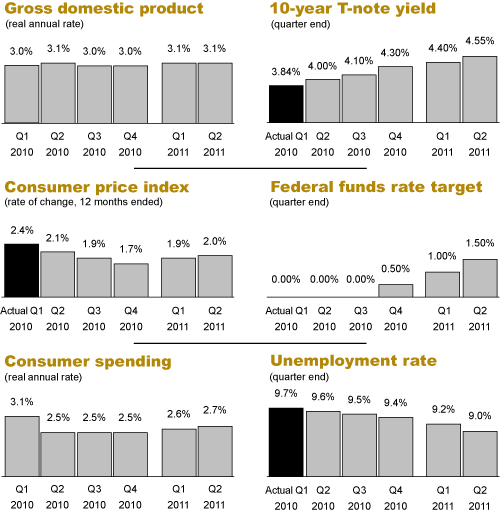 |
April 27, 2010
Global
Written by Jeff Thredgold, CSP, President, Thredgold Economic Associates
The overall global economy has returned to a reasonable level of economic growth, led by Asia. Such renewed growth follows the first global recession since just after World War II.
Even as overall global growth has returned, it is uneven at best. Asia has returned to robust performance, led by China, India, and Singapore. The U.S. has returned to moderate growth, with numerous growth forecasts revised higher in recent weeks. Latin America and Africa are also performing better, while Europe deals with a myriad of issues, leading growth to actually slow in recent months.
Chinese economic growth has returned to low double-digit annual levels, fueled by a solid rise in exports and major fiscal stimulus. Fears of overheating, especially in regard to real estate values, have led the government to make it more difficult for people to purchase and finance homes, especially homes bought as investments. The central bank is concerned about higher inflation pressures.
Indian growth has also returned to more impressive levels. Inflation pressures have approached a 10% annual rate, leading the central bank to tighten monetary policy twice in recent months. Japan has returned to limited growth in recent quarters, with such growth tied to government stimulus, stronger consumer demand, and rising exports to Asia.
Economic growth in the city-state of Singapore spiked at a 32% seasonally adjusted annual rate during 2010’s first quarter (that’s not a misprint) led by a 139% jump in manufacturing. Such growth has led to monetary tightening as well. South Korean growth has also returned to a solid pace.
Sluggish Europe
As usual, the laggard is Europe. The surprising return of modest euro-zone growth during 2009’s third quarter nearly ground to a halt in recent months. Rising anxiety about the Greek debt situation has only escalated in recent days, with Standard & Poor’s downgrade of Greek debt to “junk” status.
Similar anxiety exists as to the quantity and quality of debt issued by Portugal (also downgraded), Spain, Italy, and Ireland. It remains safe to say that the Maastricht treaty, which sets out borrowing limits for euro-zone countries, “is facing its biggest challenge since its adoption in 1997.” (The New York Times)
Massive Stimulus
While growth has returned, most recognize that it has been associated with massive amounts of money creation and massive government spending, tied to almost unprecedented budget deficits in many countries. Both the International Monetary Fund (IMF) and the “Group of 20” nations (G20) strongly suggest that such monetary stimulus must be pulled back and budget deficits sharply reduced.
Most major nations, including the U.S., have targeted a strong boost in exports in coming years as a major contributor to economic growth. Many nations will be disappointed.
The global economy stood at the precipice of depression 18-20 months ago…and avoided that fall. Aggressive steps needed to reduce monetary and fiscal stimulus over the next few years will be critical to avoiding that precipice again.

|

|
Quarterly economic survey
The USA TODAY economic survey of 46 top economists was conducted April 16-21. Median estimates through Q2 2011:
|
USA TODAY • Monday, April 26, 2010
 |
Survey participants: Dean Baker, Center for Economic and Policy Research; Nariman Behravesh, IHS Global Insight; Richard Berner, Morgan Stanley; David Berson, The PMI Group; Jay Brinkmann, Mortgage Bankers Association; Bill Cheney, John Hancock Financial; David Crowe, National Association of Home Builders; J. Dewey Daane, Vanderbilt University; Richard DeKaser, Woodley Park Research; Rajeev Dhawan, Georgia State University; William Dunkelberg, National Federation of Independent Business; Michael Englund, Action Economics; Lyle Gramley, Potomac Research Group; Ethan Harris, Bank of America-Merrill Lynch; Maury Harris, UBS; Stuart Hoffman, PNC Financial Sevices Group; David Huether, National Association of Manufacturers; William Hummer, Wayne Hummer Investments; Dana Johnson, Comerica Bank; Paul Kasriel, Northern Trust; Dean Maki, Barclays Capital; Daniel Meckstroth, Manufacturers Alliance/MAPI; Jim Meil, Eaton; Robert Mellman, J.P. Morgan; George Mokrzan, Huntington National Bank; Joel Naroff, Naroff Economic Advisors; Frank Nothaft, Freddie Mac; Donald Ratajczak, Morgan Keegan; Martin Regalia, US Chamber of Commerce; Chris Rupkey, Bank of Tokyo-Mitsubishi UFJ; John Ryding, RDQ Economics; Joshua Shapiro, MFR; Robert Shrouds, DuPont; Allen Sinai, Decision Economics; James Smith, Parsec Financial Management; Sean Snaith, University of Central Florida; Neal Soss, Credit Suisse; Diane Swonk, Mesirow Financial; Jeff Thredgold, Thredgold Economic Associates; Bart van Ark, The Conference Board; Chris Varvares, Macroeconomic Advisers; Mark Vitner, Wells Fargo; Brian Wesbury, First Trust Advisors; David Wyss, Standard & Poor's; Lawrence Yun, National Association of Realtors; Mark Zandi, Moody's Economy.com
 |
|
|
Subscribe to the Tea Leaf
Like what you just read? Have Jeff Thredgold’s Tea Leaf emailed to you free each week. Subscribe today.
|
|
|

“Tea”ser
TEACHER: Millie, give me a sentence starting with ‘I.’
MILLIE: I is…
TEACHER: No, Millie. Always say, ‘I am.’
MILLIE: All right…I am the ninth letter of the alphabet.

“Tea”stimonial
“Your talk at our Professional Day Convention in Greensboro, NC was exceptional. It is rare that we receive so many complimentary comments regarding one of our speakers.”
• More testimonials
Invite Jeff Thredgold to speak at your next conference, meeting, or client function
If you like the Tea Leaf, you’ll love Jeff Thredgold’s live presentations. Jeff takes your audience on a timely, engaging, and entertaining tour of the U.S. economy and financial markets. Debunking some of today’s most common economic myths, he offers a clear picture of how the American economy is really performing and what that means for the future of your finances.
• ***Watch Jeff Thredgold’s new demo video.***
• Download more information that you can e-mail to other decision makers.
• See Jeff Thredgold’s speaking calendar.
• Tell us about your event using our online form and we will contact you. Or, is there an individual in your organization you would like us to contact?
• Give us a call at 1-888-THREDGOLD (847-3346) to ask about Jeff’s availability and pricing for your event, or for any other information.
|
